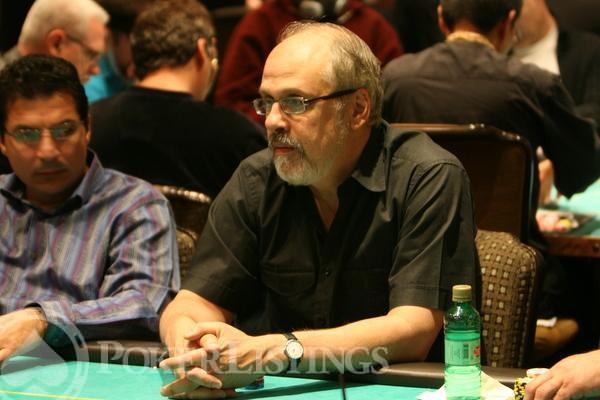Poker Term Nitty
The term 'gap concept,' first introduced by renowned poker author David Sklansky, refers to the idea that a player needs a better hand to call a raise than to open the pot themselves.
For example: if it is folded to you in middle position it may be correct to open-raise A♥J♠; however, if you're facing a raise from a tight player under the gun, A♥J♠'s value shrinks dramatically.
We’ve heard over and over from professionals that poker favors the bold, and if you want to win massive pots, you have to build it yourself. Despite all of these, some players are still playing too safe; these are the players that we call “nits.” The term “nit” refers to a player who uses an exceedingly tight strategy in the game.
- Nitty The origin of the noun sense (“ dope fiend, druggie”) is unknown, but could refer to a person who is under the influence of drugs to the extent that he or she is careless about personal hygiene and unkempt. Compare the verb nit (“to be a nitty ”). Yoooooo that homeless guy looks like a bitty cuse he got drugs in his hand.
- The one poker glossary you need to understand pokerese. My goal is to create the ultimate glossary of poker terms; the one place you need to visit to make sure you understand words dealers might say to you at tables built on bricks or a player might chat to you at a table made of bits.
- Phil Hellmuth: The 11-time WSOP champion seemingly has no fear of grinding down to just a handful of big blinds in a tournament. He typically plays super nitty, waiting for people to “bluff.
This is clearly because an early-position player, when they raise, feels that their hand is already better than the rest of the table.
After all, their raise has to make it through the entire table and each player left to act could potentially hold a better hand.
If, however, he raises from late position, they're really only saying 'my hand figures to be best against everybody else.' Thus an early-position raise holds a lot more weight than a late-position raise because it needs to beat more players.
How the Gap Concept Works in Poker
Which is why when you are facing a raise, you should tighten up substantially. You must have a hand that is stronger than what you would have required to open the pot for a raise yourself.
This is to make up for two things: the lack of initiative you have from calling, and the fact that your opponent is telling you that he thinks his hand is strong enough to beat the field.

If your hand isn't stronger than your normal raising range from that position, you risk 'being dominated.'
Being dominated means you and your opponent share your biggest card but he has your kicker beaten. For example your opponent has A♥K♥ and you have A♠Q♣ - a recipe for disaster.
Playing a dominated hand can be extremely problematic, and this is why the 'gap concept' was born. Those times that you do hit your ace you are going to end up spending a lot of money to find out you are second-best at showdown. The gap concept can help save you from many of those.
What the actual gap is is by no means set in stone. Ultimately, the gap can shrink or grow depending on the player opening the pot and the situation.
If your opponent plays very nitty, then the gap may be very wide. If, however, your opponent is a loose-aggressive player, your gap might be very small or even nonexistent.
Many players feel that 'the gap concept' is an antiquated piece of poker strategy, with no real place in today's aggressive games. This is not true.
Although the rule itself has become a bit dated, the logic behind it remains the same. When you call, you want to have a hand that figures to be best now - or has good equity against your opponent's hand.
More beginner strategy articles from Dan Skolovy:
This week for The Ten we did “biggest nits” — in other words, the tightest regulars in both tournaments and cash games. Being on this list isn’t necessarily a bad thing, as patience and discipline pay off in poker. Some of the players on here are among the most successful grinders around.
Based on suggestions from our Facebook fans, we have assembled a ranking, trying our best to find some evidence to back up the claims. For some players, the reputation as a nit might have been developing for years, without any specific event to prove conservatism on the felt. In any case, here they are:
1. Allen Kessler: The video poker grinder is a legend for scrambling to find free rooms and food comps in order to increase his equity. Despite $2.3 million in career tournament earnings, Kessler will go to any length to get save a buck. With comps comprising about 25 percent of casino costs, one has to wonder if the economy of the Las Vegas Strip would pick up again if creatures of Kessler’s kind weren’t on the prowl.
2. Tony Cousineau: With 49 cashes at the World Series of Poker without a win, Cousineau is the professional min-casher. He has a whopping 163 careers times in the money in major poker tournaments, with just three wins. Remarkably, he hasn’t won a poker tournament since 2003, despite being one of the regulars on the tournament circuit. If Allen Kessler didn’t put in penny-slot sessions, Cousineau would be at the top of this list.
Poker Term Nitty Meaning
3. Chris Ferguson: Despite allegedly playing with funds milked from poker players around the world, Ferguson has a history of refusing to straddle and play the 7-2 variant in cash games, to go along with an already nitty playing style. Taking one of the largest pieces in the “global Ponzi Scheme,” it seemed like Ferguson was on TV more to advertise the Full Tilt brand than to actually play some exciting poker.
From about the 3-minute marker on you can see what it’s like to play cash with Ferguson:
Note: Watch how Hellmuth (also on this list) calls Ferguson out.

4. Phil Hellmuth: The 11-time WSOP champion seemingly has no fear of grinding down to just a handful of big blinds in a tournament. He typically plays super nitty, waiting for people to “bluff” him or “give” him chips. Below is one of many examples out there of the “Poker Brat” folding a monster when most aggressive players would consider shoving any two.
5. Howard Lederer: Like his Full Tilt partner in crime, Ferguson, Lederer became a multi-millionaire thanks to the site he helped found, but nonetheless played like he must have when he was basically a homeless poker player in New York during the 1980s.
Here’s a look at one of Lederer’s most famous hands, where he lets the aggressive Tom Dwan make him look silly.
6. Jerry Buss: The 77-year-old majority owner of the Los Angeles Lakers is a poker aficionado, dabbling in some of the biggest cash games in the world. However, don’t expect his $600 million net worth to lead to spewage. Buss is widely considered one of the biggest rocks in the game of poker.
Poker Term Nit
7. Teddy Monroe: The Iceman, a cash game grinder for nearly three decades, told Card Player, “If I go up early in a session I try to play much tighter. I know how easy it is to get trapped, and right now money means a lot. There is a serious recession in the nation right now, and if you have to be disciplined to avoid the tough swings. I’ve been in the game a long time, and I’ve truly developed patience for grinding day in and day out. For example, if I have pocket aces at $2-$5 and I make it $45. If somebody who has $400 on the table goes all in, I will throw my hand away and quit the game. I would be frustrated that I threw away the aces, as I didn’t get a chance to see the flop. Basically I minimize my potential losses. I don’t have huge swings anymore.”
It’s ultra-conservative to even consider folding aces preflop in hold’em, but Monroe has been surviving in the game for longer than most.
Poker Term Nitty Gritty
8. Online Bum Hunters: There are so many potential players that fit into this category, we are not going to try and call out names. These players have a knack for sitting out once a fish leaves the table, and while it may be optimal strategy, the practice is detrimental to the health of poker and makes some of its star online grinders look a bit nitty.
9. Dan Harrington: Despite the irony of his nickname, “Action Dan” Harrington is one of poker’s all-time greats and has reached this plateau by being regarded as one of the game’s tightest players. Although he has the ability to mix up his game and run a bluff by you, the poker Hall of Famer is generally pretty snug.
10. Tommy Reed and David Fishman: You might never have heard of these two poker players, but their respective plays during a televised poker game are stuff of nit legend. Check out the following two hands:
Tommy Reed Folds a Set
David Fishman Folds Aces Preflop
Note: Keep in mind that this was pot-limit hold’em, and with the format of the PokerStars Big Game, he had extra incentive to avoid losing money.